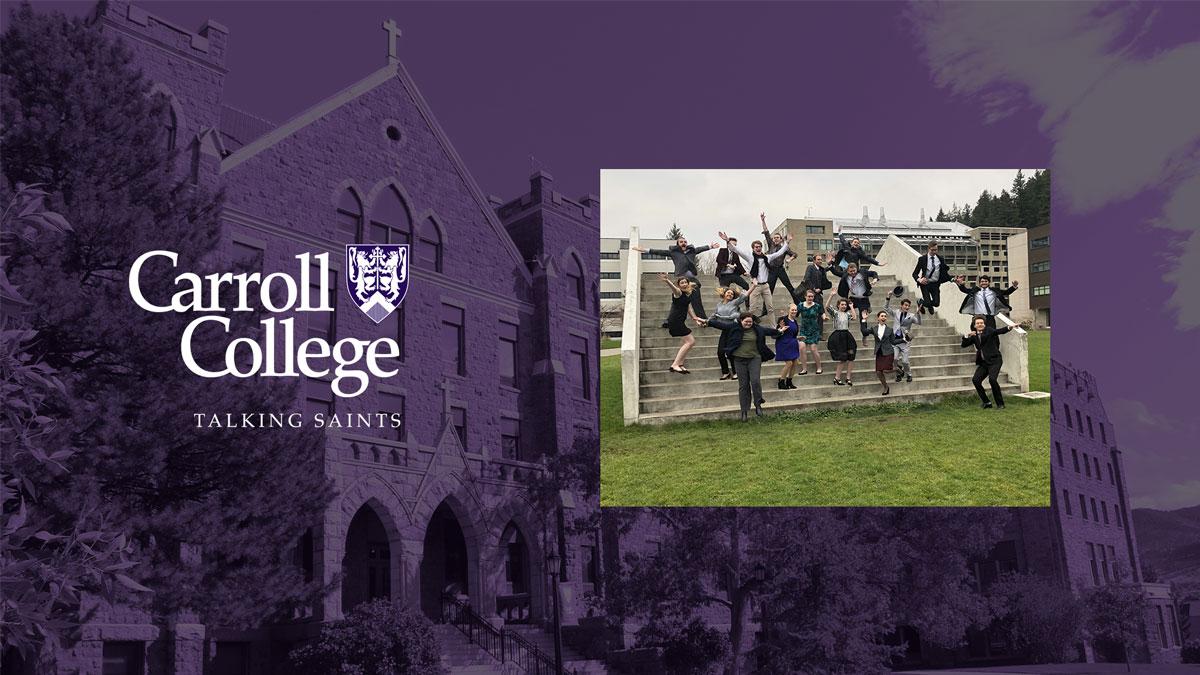HELENA – The newest Carroll College Talking Saints won four awards at the Pacific University’s virtual tournament on October 24, hosted online from Forest Grove, Oregon. Meanwhile, in virtual London, three Carroll teams took on the world’s best.
At Pacific, Carroll entered only its first-year students, and they won four awards. Matt Glimm, a biology major from Kalispell, won novice extemporaneous speaking and placed fourth in impromptu. Elaina Goulet, a biology major from East Wenatchee, Washington, placed 3rd in novice impromptu. Finlay Bates, a pre-law major from Forest Grove, Oregon, placed 5th in novice extemp.
Bates and Goulet had never competed in speech and debate prior to college, so their success is encouraging. Goulet was particularly pleased because the COVID/online year has been challenging.
“It was uplifting to realize that this unusual year did not put the freshmen far from being equal to previous years,” said Goulet. “For me, specifically, it was good motivation to keep working for the future.”
Goulet was referring to the changes in training, where most practices are online, and competition is online. In person contact with coaches was minimal at first, but is now all coach contact is virtual.
But the first-years are doing well, and adapting.
While the new students competed at Pacific, three Carroll teams entered one of the world’s most competitive tournaments, hosted by Oxford, Cambridge and Durham in London, England. More than 200 teams from around the world competed.
After opening with a win in round one and solid showings in the next round, Carroll was power-matched against the best in the world – and, on this weekend, Cambridge and Yale prevailed.
“Debating internationally against top universities has been a blast, the best experience in my four years of debating,” said senior International Relations major Josh Mansfield from Pocatello, Idaho. “It requires a new definition of success though. Every round is very hard with those teams. When we get home we have to debrief, recoup and work with our coaches. Our knowledge is pretty good, but we need to adapt our strategy for different types of teams and for each position.”
Partner Hellie Badaruddin, a sophomore from Missoula, appreciated the quality of judging.
“All the judging abroad has raised the bar on what we expect,” said Badaruddin. “Even when we don’t agree at first, we get long explanations that we can accept and learn from. Judging is miles ahead of what we see here.”
Debating abroad also means adjusting to time zones. London is seven hours later than Helena, so competition began at 1 a.m. Saturday morning Carroll time and continued past noon. That was challenging, too.
“We started out tired at 1 a.m. and finished more tired 12 hours later,” said Mansfield.
When the sun rose, Mansfield and Badaruddin faced their toughest rounds, and their bodies were programmed to need rest. Carroll teams will have to adapt to the night shift, perhaps by resting the night before.
“It’s kind of reverse jet lag,” said coach Brent Northup. “We stay up the day before, without sleep, and are tired when we start. Going to sleep early at 6 p.m. is not as easy as a head on a pillow. But it’s a challenge we’re willing to face and overcome.”
A first-year team jumped into the London tournament when a spot opened, knowing they were walking into rounds with Princeton and Oxford.
Goulet and partner Josie Howlett of Bigfork, Montana, got pounded in early rounds but that just made them dig their heels in and push harder.
“The London tournament was an amazing experience,” said Goulet. “Josie and I learned a ton throughout the tournament and it was really interesting seeing all of the different types of cultures and countries coming together. It was a little difficult debating at 1 a.m. but it was totally worth it. The topics were also very interesting and ranged from voting insurance to minority equalities. My favorite topic was whether this house regrets the use of the word ‘fight’ when relating to illnesses like cancer.”
The Talking Saints are adapting to the COVID year by taking advantage of virtual tournaments, that meant they could compete against the world’s best without a plane flight.
“Suddenly, we are meeting world-level teams, and we clearly have to up our game,” said Northup. “Carroll’s best students are as bright and as motivated as the top European students, but our lack of experience at that level puts us on a steep learning curve. But we’re all determined to recalibrate our expectations and our work effort.”
Northup says debating internationally helps students raise their standards.
“Carroll students sometimes underestimate themselves,” said Northup. “And by competing against London School of Economics and Leiden University from the Netherlands, and holding their own, we send a message to all Carroll students to dream big. The cultural education and new friendships are invaluable, too. It’s worth noting we’re going to have to take ego bruises along the way, but that’s how we learn and grow. The team’s attitude is ‘Bring it on!’”

